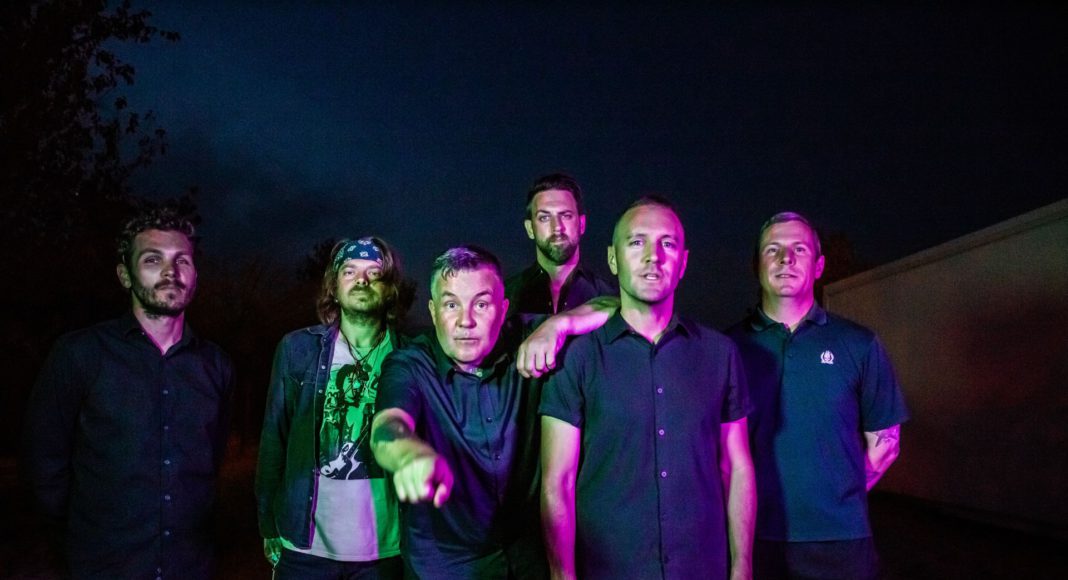Boston’s Dropkick Murphys started playing their politically infused Irish punk rock music in Boston 28 years ago. “We didn’t start out to be political,” said Ken Casey, one of the band’s founders and the only original member still in the band.
“The songs came out of our working class roots,” he said. “We were raised to believe it was important to stand up for what you believe in—equality, good versus evil, poor versus rich, working hard and being treated fairly. All part of our background. My father died young and my mother cut people’s hair in our kitchen.”
The Murphys built their reputation by constant touring and the celebratory concerts they put on each year on Saint Patrick’s Day.
“We’ve always mixed traditional tunes with our own originals,” Casey said. “We play some of the songs fully acoustically and some electric. It’s maybe 20% acoustic, depending on whether it’s a ballad or a traditional song. This time around, we’ll be playing a lot of stuff from our first album, Do or Die. It’s fun to revisit stuff you haven’t done for a while.”
As they became known for their political songs, they were approached by Nora Guthrie, Woody Guthrie’s daughter, about writing music for some of the lyrics in her father’s archives. “Cole Quest, Nora’s son, was a big fan of ours so Nora invited us down to sift through Woody’s unpublished lyrics. That was about 20 years ago. The plan was to make an album, but it took a long time to get it done.”
Casey said that going through the archives was an amazing experience. “Today, it’s all been digitized. Back then, we got to go into a climate controlled room and wear special white gloves. We got to hold the papers gently, papers Woody had actually written on, covered with wine stains and coffee stains. I felt like I made a connection with him, holding those pages,” he said.
Some of the pages only had one sentence, or part of a verse. Others were fully formed songs with verses and a chorus, but no music. Casey and the band copied the lyrics and set one of them, “I’m Shipping To Boston,” to music. It was a hit. When Martin Scorsese put it on the soundtrack of his film, The Departed, it gave their career a boost.
As the political climate began getting more conservative a few years ago, Casey began thinking about making the album they’d been planning for so long, using Guthrie’s lyrics. “His message resonates more than ever right now,” Casey said. “I’m glad we’re able to bring that message to the world.”
Just before the pandemic closed everything, the band went down to Oklahoma to record the tunes at Leon Russell’s Church Studio. They cut 21 songs, all played acoustically, which produced enough for two albums. This Machine Still Kills Fascists, released in 2022, has darker more political songs and Okemah Rising, released last May, has songs that are more musically and lyrically upbeat, although still political.
The band recorded the albums live, all in the same room together. “I’d sing a vocal melody and we built the songs around that,” Casey said. “Many studios have isolation booths, but we were all together in one big room. It had a great live feel. We tried a lot of tricks to get a good sound, like putting pieces of paper between the guitar strings to get an extra buzz. It was challenging to get a different dynamic for each song, just using acoustic instruments. Our producer, Ted Hutt, is part therapist, part motivational coach, part orchestra leader. He brings out the best in us and gets us to go deeper into the music.”
The songs on the albums have the timeless feel of all good folk tunes. “Ripping up the Boundary Line” is driven by a beat that’s halfway between rock and R&B, with the band’s sing-along chorus celebrating communal solidarity. Casey sings softly on “When I was a Little Boy,” a ballad about the joys and responsibilities of growing up. Tim Brennan’s penny whistle fills give the song a melancholy feel.
“The melodies just jumped off the paper,” Casey said. “The songs fit the moment we’re in. Woody’s passion for worker’s rights, human rights and his willingness to stand up and fight fascism. It brought back memories of my grandfather, who fought in World War II, and was a union organizer. All that led to the Civil Rights Movement and Women’s Rights, all the things they’re trying to roll back now. Woody would have been inspired to write songs about this, if he was still alive today.”
Dropkick Murphys
135 West San Carlos Street, San Jose
Tues, Feb. 13, 7pm
$49.50/adv—$59.50/show



